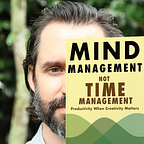How Prioritization will help you achieve Full Focus
Of all of the components of achieving Full Focus, Prioritization is the most critical.
When you have clear Priorities, you can act smoothly and swiftly. When you don’t have clear Priorities, you’re second-guessing yourself, you’re scrambling, and you’re prone to making mistakes.
Imagine you wake up on a day you’re traveling. Your flight doesn’t leave until 3pm.
If you’re like most people, at some point, you’ll ask yourself what time you should head to the airport—mentally calculating buffer time, thinking about how long it takes to get there, and calculating more buffer time for traffic and waiting for your Uber.
These mental activities involve Prioritization.
While you’re standing in front of your closet, checking the weather, you get an angry email from your boss. Do you have the mental resources to handle it with grace?
It’s a lot of moving parts all at once. If you’re anything like me, thinking this way early in the day is tough; and you always have a movie running in your head about missing that flight.
Now, imagine if instead, your Uber was already scheduled, you already had a packing list on Wunderlist, and you had already agreed upon a time for the dog-sitter to pick up the keys.
Now, your day is less hectic. You’re less likely to forget to pack your umbrella, you have more mental energy leftover for calming your boss, and that movie in your head about missing the flight is less intense.
Your Priorities are already set, and many decisions are already made. You’re free to be in the moment.
Prioritization is the most mentally-draining type of thinking (Your Brain at Work, David Rock). Weighing decisions uses your Prefrontal Cortex, which is an energy-hungry portion of the brain.
If early in the day isn’t a good time for you to do Prioritization thinking, it will be even tougher. If you’re also switching from Prioritization mode to Administrative mode—answering your boss’s email—more mental energy is being wasted switching mental states.
To achieve Full Focus, make Prioritization a priority. Here’s some ways to do that.
- Schedule a weekly review. Set aside a time each week, when your capacity for Prioritization is at its peak, to make decisions in advance. I like early Sunday afternoons, because I’ve rested over the weekend. If I have a flight in the upcoming week, I make decisions ahead of time about when to leave for the airport, or how the weather might affect my packing decisions.
- Prioritize habits. Habits save you from Prioritization when your mental energy is low, while conserving your creative energy. I have a habit of writing in the morning, earplugs in ears, facing a blank wall, because that’s when I’m most creative—yet also when I’m most prone to distraction. Start small with habits, and build them into your weekly ebbs and flows.
- Stop and Prioritize. Recognize when unclear priorities are getting in the way of what you’re doing in the moment. Stop trying to do what you’re doing, and take a few minutes to Prioritize (set a timer, if it makes you less anxious). Step away from your phone and computer and review your priorities on a piece of paper. When you’ve made your priorities clear, you can move forward again.
- Prioritize your life. Priorities are nested, like Russian dolls: what you’re doing at the moment is held in place by your priorities for your career, and your life. Take time to Prioritize your life direction. The holiday season, leading up to the New Year, is a great time for that. Or, try Warren Buffett’s 25/5 technique, which James Altucher mentioned on my podcast.
When you follow the principles of Full Focus, and get your priorities clear—from your life’s purpose, to the moment at hand—you can act swiftly and smoothly, and free your creative energy. Arranged with the 6 essential components of Full Focus, Prioritization will lead you to creative productivity.
I interviewed James Altucher on my podcast, and you should listen here, because it was great.
